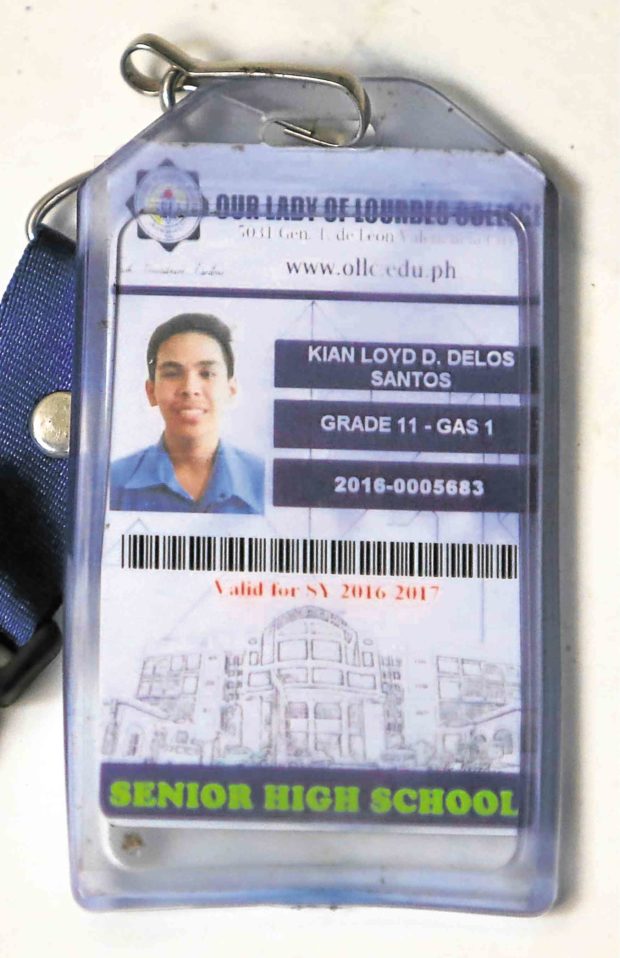War on drugs: The violence, scars, doubts and families it left behind

Policemen (back) look at a mother, Nanette Castillo, as she grieves beside the dead body of her son Aldrin, an alleged drug user killed by unidentified assailants in Manila on October 3, 2017.
Philippines police officers who want to speak out about “extrajudicial killings and summary executions” in President Rodrigo Duterte’s drug war have been offered sanctuary and legal help by the Catholic Church. The Catholic Church, which counts 80 percent of Filipinos as followers, has been one of the leading critics of the drug war and its offer to police on Monday was another step in its efforts to stop the killings. (AFP PHOTO / NOEL CELIS)
MANILA, Philippines — As President Rodrigo Duterte prepares to deliver his sixth and final State of the Nation Address (Sona) on Monday, families left behind by victims of extrajudicial killings (EJK) tied to the war on drugs and “Oplan Tokhang” remain in pursuit of justice.
Less than a year before Duterte’s term officially ends, many, especially critics, say that the administration’s “human rights crisis” and countless alleged human rights violations will be one of (if not) the biggest legacy of the Duterte presidency.
War on drugs: The first months
After a landslide victory in the 2016 national elections, with more than a 6-million gap in votes ahead of runner-up, Manuel “Mar” Roxas II, Duterte stayed true to his promise and began his term as President by launching his fight against illegal drugs on June 30, 2016.

Then Davao City Mayor Rodrigo Duterte on the 2016 presidential elections campaign trail (MARIANNE BERMUDEZ / INQUIRER file photo)
In the first seven months of the Duterte administration,, INQUIRER.net tallied 2,126 deaths (1,104 by police and 1,022 by unknown hitmen) in the administration’s gruesome anti-illegal drugs campaign in the country.
Unable to eradicate illegal drugs in the country in six months, Duterte himself admitted that he had failed in his promise.
Between July 1, 2016, and Dec. 31, 2020, the official government figures list 6,011 deaths in anti-drug operations.
The UN Office of the High Commissioner for Human Rights (OHCHR), however, found that as of March 2020 at least 8,663 deaths have been recorded.
Other human rights organizations, on the other hand, pegged the death toll at over 20,000.
The Philippine Alliance for Human Rights Advocates and iDefend also reported that from July 2016 to December 2019, a number of 122 children were killed in the anti-drug campaign.
This figure, however, is expected to have gone up in 2020 amid the COVID-19 pandemic.
Meanwhile, in a study conducted by the University of the Philippines, it tallied that the security forces have killed at least two individuals per day since the anti-drug campaign started.
The study showed that based on the rate of killings, 2016, 2018, and 2021 appeared to have had the bloodiest years in the campaign, with at least 3.1, 2.1 and 2.17 killed every day during those years, respectively.
“Nanlaban”
Members of the security force claim that the deaths were caused by drug suspects who attempted to fight back, more commonly known as “nanlaban.”
A recent report, however, from international rights watchdog Investigate PH, claimed that the Philippine National Police (PNP) has been covering up the circumstances of the killings during anti-drug operations.
The report claimed that in a hearing conducted by the said rights group on May 18, photographs of dead victims who were tagged as “nanlaban” wore handcuffs and zip ties, indicating that there was no way they could have resisted arrest.
This was supported in the same hearing by professor of forensic pathology Dr. Raquel Fortun, who said that she encountered these indications in bodies of drug war victims that she autopsied.
Autopsy tales
According to Fortun, some of gunshot wounds were on the wrists of victims “who were raising their arms in front of themselves as they were shot.”
These defensive wounds of victims were not even recorded by the police.
Fortun also revealed that one body she autopsied had post-death incisions and sutures, indicating an autopsy had been done.
But Fortun found out that it was not even properly conducted.
The death certificates were also signed by physicians associated with the police, which indicates cooperation by medical professionals in the cover-up of extrajudicial killings — a violation of medical ethics.
The PNP, however, has since denied these accusations.
In search of justice
Amid the killings, families of EJK victims have sought justice for the death of their loved ones.
Rise Up, a human rights group that provides assistance to families of EJK victims, together with the National Union of People’s Lawyer (NUPL), managed to file seven charges before the Office of the Ombudsman.
Of the seven cases, only one managed to reach the Supreme Court while three were dismissed even after motions for reconsideration due to lack of testimonies and evidence.
Three of the dismissed charges were cases involving Joshua Laxamana, a 17 year – old computer gamer who was shot dead by police from Rosales, Pangasinan last August 2018; Myke Ulpina, a three-year-old child who died after being caught in a crossfire between suspected drug pushers and police officers in June 2019 and Jerson Sta Rita, a security guard who was killed in a buy-bust operation in November 15, 2018.
Fear and missing witnesses
A representative of Rise Up, Rubylin Litao explained to INQUIRER.net the difficulty of securing testimonies from witnesses is mainly due to fear.
She cited one instance when one of the witnesses they had for a specific case suddenly disappeared and refused to get involved further in the case.
“Nagsalaysay na pero ‘yung isa later, ayaw na. Hindi na makita ng pamilya, lumipat na ng bahay. Basically natatakot, tapos ‘yung iba ayaw ma-involve,” Litao said.
(They were already giving their testimonies but would later back out. Afterwards, the family could no longer contact them, even going as far as moving homes. Basically, they are scared, while others just don’t want to get further involved.)
She also said that some families who try to get hold of police documents involving their loved ones face intimidation from police officers.
“May experience kami sinasamahan namin sa pulis station, tatanungungin ka, i-intimidate ka,” Litao said.
(We have also experienced accompanying a witness to the police station where they were questioned and intimidated.)
Discrepancies in police reports and death certificates have also been encountered by Rise Up, according to Litao.
“Copy paste” death certs
“Minsan makikita mo ‘yung police report parang copy paste … tapos ‘yung death certificate may nakalagay dun may tama ng baril ha, ang nakalagay pneumonia. Pag tinanong namin sa pamilya kung bakit iyon ang nakalagay, eh ang isasagot ay pumayag sila dahil [kung hindi], hindi raw maiuuwi at malilibing ‘yung bangkay,” Litao said.
(Sometimes you’ll notice that some police reports are too alike and then some death certificates declare that the cause of death is pneumonia. When we asked the family why they allowed it, they said they had to agree, otherwise, the corpse would not be released.)
According to Litao, because most of the drug-war victims are “breadwinners,” many of the families have since struggled to make ends meet.
“Meron pa nga kaming instances pag pumunta ng burol, walang damit, walang pagkain,” Litao said.
(There are even some instances where once we get to the wake, they don’t have clothes nor food)
Last SONA? Not expecting much…
When asked what the families expect from Duterte’s final Sona, Litao stated that they don’t expect anything from the President at this point.
“Kahit ano pang sasabihin niya sa huling taon niya, kailangan niyang managot, ‘yun ang pagkakaisa din ng mga pamilya. Sa huling panunugkulan niya ano pang aasahan namin? Wala naman siyang sinasabing matino sa mga huling Sona niya. Puro pagpatay at puro pagbigay kunsinte lang sa mga pulis,” Litao said.
(Whatever else he says in his last year, he has to take responsibility, that’s also what the families want. What else can we expect, even in his past Sona, all he said was about killing or condoning police officers.)
“So kami wala na kaming aasahan pa, kung meron, ‘yung pagpapatuloy niya ng panunupig, so dapat na talaga siyang wakasan,” she added.
(So we have nothing to look forward to, if there is something, it is the continuation of his oppression, that’s why it’s time for his term to end.)
A flicker of hope
Families of victims, however, remain hopeful at attaining justice, especially after the International Criminal Court (ICC) has formally requested judicial authorization to investigate the crimes against humanity filed against Duterte, said Litao.
“‘Yung isang nanay nung narinig niya ‘yung sa ICC, nung nabalita ‘yan, may isang nanay na nagsabing tuwang tuwa siya. Kahit konting silip ng pagasa nakikita nila dun sa ICC,” she said.
(A mother who leaned about the ICC investigation said she saw a glimmer of hope. They see the ICC as a small glimpse of hope.)
“Sinasabi naman namin na matagal po ‘yan at hindi rin kaagad agad ‘yan, pero ang sinasabi niya, alam nila, pero at least meron daw silang nakikita. So malaking bagay ‘yun na nagboost ng pagasa at ng tapang din,” she added.
(We tell them that it would take a long time, but what they said that at least they see something positive. It’s such a big thing that it gives them hope and courage.)
Rise Up is currently monitoring and assisting more than 200 families of victims killed amid the anti-drug campaign.
Since its formation in October 2016, families of EJK victims have been the main focus of the group, working with them to document the killings.
In a separate statement, Rise Up said that even while the prospects of attaining justice through the Philippines courts appear “slim to none,” their desire for justice remains strong.
“The help of human rights lawyers and a common belief that injustice must not prevail, allows us to push for accountability to break the prevailing climate of impunity,” it said.
The Kian Delos Santos case
To date, of the number of killings committed during the administration of Duterte, only one case has successfully charged police officerds — the case of Kian Delos Santos, a Grade 11 student, who was killed in a police operation in Barangay 160, Caloocan City.

This photo, taken in September 2017, shows three police officers accused of killing of 17-year-old Kian Loyd delos Santos appearing for their preliminary investigation at the Department of Justice. From left: PO1 Jerwin Cruz, PO3 Arnel Oares and PO1 Jeremias Pereda. (File photo by GRIG C. MONTEGRANDE / Philippine Daily Inquirer)
Police claimed that Delos Santos resisted arrest and opened fire at them when he was apprehended, but closed circuit television (CCTV) camera footage showed lawmen dragging the victim before he was found shot to death.

Kian Delos Santos, a Grade 11 student, died after he was shot during a police operation in Barangay (village) 160, Caloocan City.
On November 29, 2018, police officers involved in the death of Kian delos Santos were found guilty.
